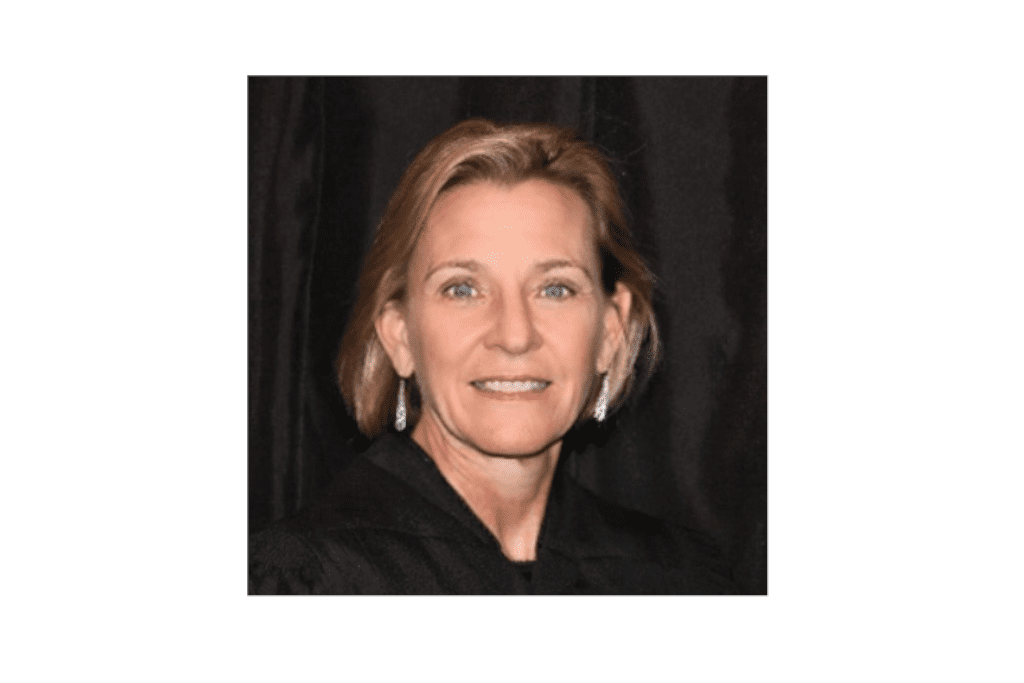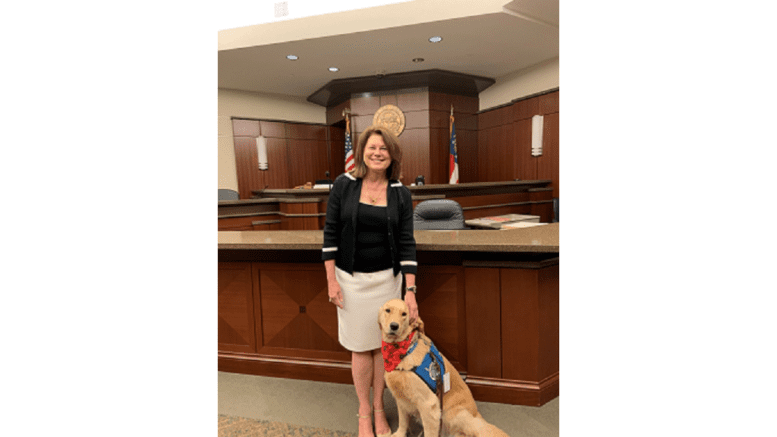Superior Court Chief Judge Robert Leonard announced new assignments to the Cobb County Accountability Courts.
Judge Mary Staley Clark will now preside over the Drug Treatment Court, and Judge Ann B. Harris, who has already been presiding over the Parental Accountability Court, will add the Mental Health Court to her duties. (The photo of Judge Clark accompanying this article includes Hope the Comfort Dog, who according to court spokesperson Kim Isaza sometimes visits with participants in the Accountability Courts. Hope has her own web page which you can view by following this link.)

The Accountability Courts were created to provide alternatives to prison sentences when treatment and counseling is more appropriate than punishment.
Accountability Courts can be both more humane and more cost-effective than incarceration.
Cobb’s Accountability Courts include a Drug Treatment Court, a Mental Health Court, a Parental Accountability Court and a Veterans Court.
The Accountability Courts are operated by the Cobb County Superior Court.
Judge Mary Staley Clark, who has been a Superior Court judge since 1992, made the following statement about her appointment to the Drug Treatment Court.
“From my experience, most families are touched by addiction and mental illness. Drug Courts give drug-using people who have come in contact with the criminal justice system a chance to secure sobriety, learn social skills such as honesty, work adherence, education and noncriminal thinking as well as reconnect with healthy family and friends. Our participants are held to a high level of accountability, including passing regular drug testing, acquiring and maintaining appropriate housing, doing work or community service, and attending community self-help programs. At graduation, all participants will have followed a rigorous two-year program, learned how to maintain sobriety, obtained gainful occupation, have appropriate housing, and addressed healthy familial relationships to include regaining custodial rights to their children.
“We are proud of the Drug Treatment Court that has evolved under the leadership of Senior Judge George Kreeger. He and staff have produced one of the best courts in the state of Georgia. I am humbled that my peers in Cobb Superior Court have selected me to take up that leadership.”
There are 59 active participants in Drug Treatment Court. Since its inception, more than 500 people have graduated and had their criminal charges dismissed.
The press release distributed by the court described the Parental Accountability Court as follows:
Parental Accountability Court is an award-winning program that seeks to transform chronic non-payers of child support into financially supportive parents by addressing their underlying issues through education, job assistance and placement, and substance-abuse treatment. It is an alternative to incarceration for those who have been found in contempt of court orders to pay child support.
The Mental Health Court is described as follows:
The Mental Health Accountability Court, established in 2013, works to improve mental health, achieve long-term stability, and reduce recidivism for individuals facing criminal charges who have a mental health diagnosis. It is a voluntary, treatment-based program and a cost-effective alternative to incarceration.
Judge Harris, who has been a Superior Court judge since 2014 had this to say about her appointment to preside over the Mental Health Court, and her continuing work on the Parental Accountability Court: “Both of these programs, like other Accountability Court programs, strive to address participants’ barriers – whether mental health, substance abuse, or lack of job skills and education – which have hindered their ability to be stable, successful, law-abiding members of their families and the larger community. These programs may not change the world, but they are certainly changing one person’s world.”
For more information about Cobb’s Accountability Courts, visit https://cobbcounty.org/SuperiorAC.

